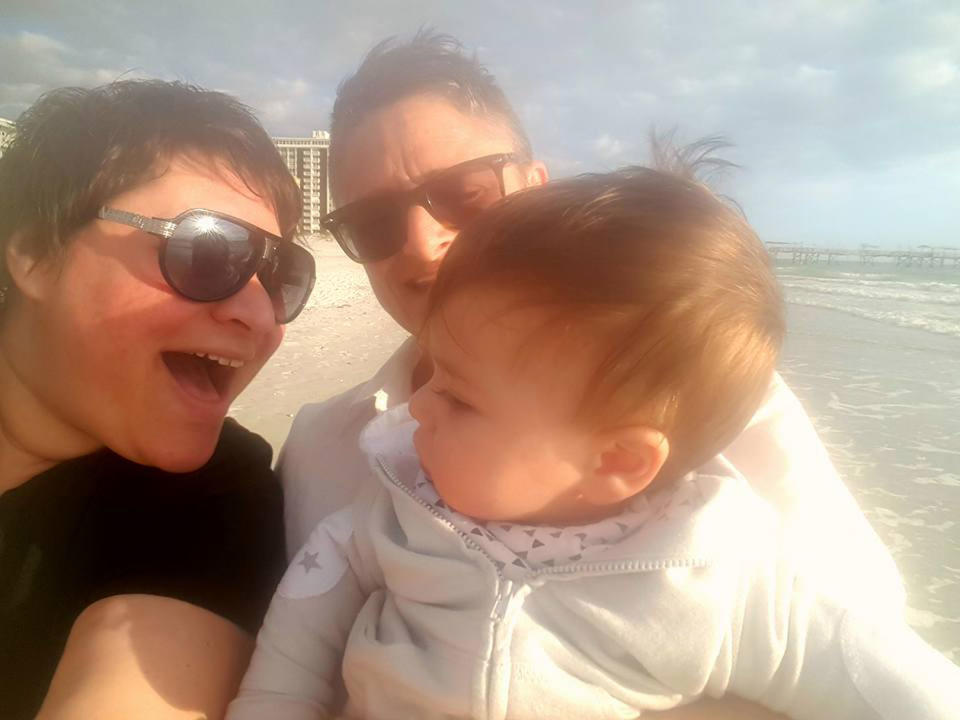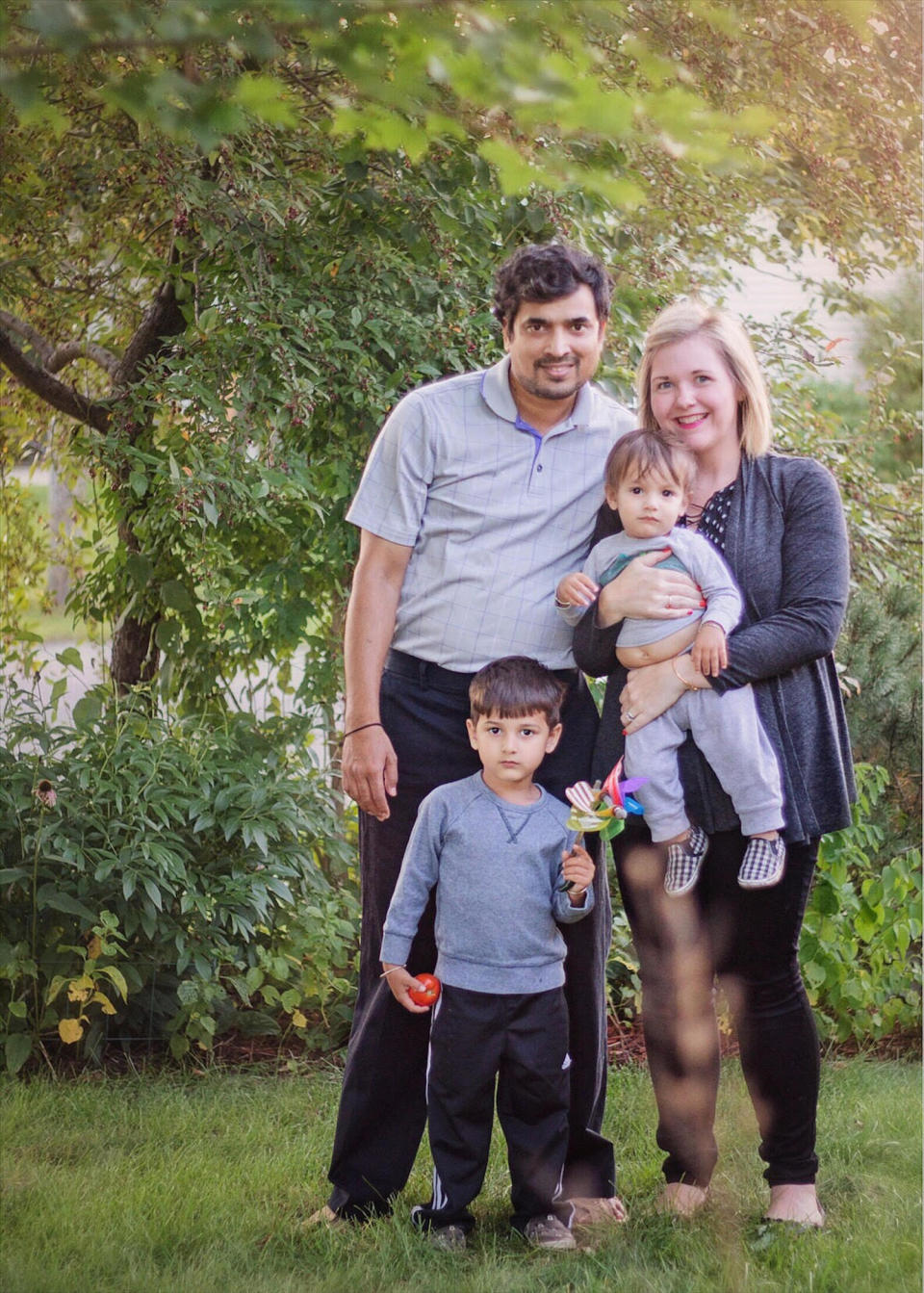How modern families are celebrating their diversity during the holidays

The holidays are often depicted in a Norman Rockwell haze, with a mom and dad of the same race and religion celebrating with their two biological children. But in reality, the holidays are celebrated by all types of families, including interfaith families and families made up of different races and sexual orientations.
Basically, fitting the “traditional” mold is no longer something all families strive for, and the holidays are a little different for everyone. Here’s what the holidays look like for several people with diverse families.
‘We just do everything.’
Fariba Soetan, who is Iranian and English, is the founder of Mixed Up Mama and writes about raising multiethnic kids with her husband, who is of Nigerian descent. She’s been married to her husband for eight years and tells Yahoo Lifestyle that for her multiethnic and multicultural family, “it’s so important for our children to know every aspect of their identity.”

“We’ve discovered that our holidays as a multicultural family are that much more interesting because we just do everything,” she says. “Christmas dinner now includes turkey, alongside jollof rice and fried plantain. And where traditions do overlap, we try to alternate holidays with one family one year and the other the next. That way, our children are exposed to both sets of traditions in full and get a taste for both sides of what makes up who they are.”
Soetan says that her family is creating their own traditions and recognizing that they do things differently. “We like it that way,” she says. “As long as you’re open to your partner’s traditions and to new ways of celebrating, the holidays can be as enjoyable — perhaps even more so — as ever.”

‘We celebrate all the big Jewish and Christian holidays.’
Susan Katz Miller married her Episcopalian husband in 1987. Miller, who is author of the upcoming book The Interfaith Family Journal, is Jewish and was raised interfaith, and she has brought that into her family. “We celebrate all the big Jewish and Christian holidays, including of course Hanukkah and Christmas,” she tells Yahoo Lifestyle.
Miller says that it’s important for her family to “celebrate both religions fully, giving equal weight to each religious heritage. That doesn’t mean that Hanukkah is as big as Christmas. Christmas is a peak moment of the Christian calendar, while Hanukkah is a relatively minor Jewish holiday. It means that over the course of the year, we celebrate many holidays from each of the two religions and give our children religious literacy in both.”
While this works for Miller’s family, she says that every interfaith family has to decide whether they’d rather celebrate one religion, both, all religions or no religions, as well as which holiday traditions are secular for them. “Each of these pathways can work; each has benefits and challenges,” she says. “It really depends on what each of you brings to the family, your support system and the communities available to you.”

‘Before we were married, there were times when we were introduced at holiday dinners as “roommates” or “friends.”’
Allison Steinberg has been married to her wife for more than five years — she tells Yahoo Lifestyle that they said “I do” the same month that marriage equality became federally legal. Since the couple legally wed, Steinberg says, they’ve been able to “show up as our full selves” to holiday celebrations.
“It turns out that the most radical thing we could have done was actually the most traditional — get married and have a baby,” she says. “We are treated with greater respect. Before we were married, there were times when we were introduced at holiday dinners as ‘roommates’ or ‘friends.’ Being legally recognized as a married couple forces people, including uncomfortable extended family at holiday gatherings, to introduce us as wives. It’s so simple, but incredibly powerful.”
Steinberg says it’s important to her that she and her wife are just themselves during the holidays — and that’s how they plan to celebrate their holidays together in the future. “Holidays are an emotionally intense time when family drama bubbles up, especially now with the volatile political climate, where homophobes and bigots feel emboldened,” Steinberg says. “It’s incredibly important that we show up to holiday gatherings as our full selves, and don’t let ignorance and hate erase who we’ve fought so long and hard to be free to be.”
Steinberg recommends that other LGBTQ families find supportive family members during the holidays. “Allies are critically important,” she says. “Family and friends who are supportive of their LGBTQ holiday guests should create an inclusive environment and make clear that there is no room for discrimination at the dinner table.”

‘We’re both very open-minded and knew that marrying someone from another culture meant that we would have to both bend a bit.’
Shari Mukherjee is an American who married her husband, Piyush, who is Indian, nine years ago. Mukherjee says that the couple celebrates “nearly everything Christian and Hindu” with their two boys.
“There are so many Hindu/Indian holidays — sometimes celebration might just mean going to the temple to attend puja (prayers/worship) for the evening, or maybe we just eat a fancier meal at home and I make some sweets,” she says. “When Piyush and I first got married, blending the holidays and traditions was pretty much a nonissue. We’re both very open-minded and knew that marrying someone from another culture meant that we would have to both bend a bit.”
Shari says that when the couple first got together, “it was more about just having fun and being together than actually learning about the holidays, traditions and rituals.” But once they had their first child, “it definitely became a bit more difficult.”
As a result, the couple “decided which holidays were most important to each of us — and those were the holidays we decided we would really focus on. We give equal importance to Diwali, Christmas, Durga Puja (the Bengali festival celebrating the goddess Durga), Thanksgiving, Easter and Ganesh Chaturthi (the festival celebrating Lord Ganesha, the elephant god). We also love to celebrate Holi (the festival of colors), but living in Minnesota makes that a bit difficult.”

Shari says that her family has been careful not to try to change traditions too much. “We don’t try to Americanize the Indian holidays, and we don’t try to Indianize the American holidays,” she says. “We want our kids to love and understand both cultures — and it can be really difficult and confusing if we try to mix them too much.”
Overall, Shari says, “it’s important to celebrate and acknowledge what traditions each partner holds special. It’s really easy to lose yourself in your spouse’s culture and traditions. It’s easy to begin to feel nostalgic, sad and even a bit resentful when you feel like your culture isn’t as important as the other.”
She recommends that intercultural families talk to each other about what they both consider important. “It’s really best to lay it all out there and keep the communication open,” she says. “If you’re in an intercultural relationship and want to begin incorporating your partner’s culture and holidays more, ask them for help. Find out what they did as children. It doesn’t have to be anything big, either. It could be something as simple as dressing in traditional outfits for the day, reading a special book or even just making a festive dessert.”

As a whole, it’s important for diverse families to celebrate diversity during the holidays, clinical psychologist John Mayer author of Family Fit: Find Your Balance in Life, tells Yahoo Lifestyle. “It conveys to those individuals that they are valued and they are important,” Mayer says. This can be especially beneficial for children, he says. “The exposure to different cultures and diversity in general develops brain power in the same way that learning another language has been proven to develop the young brain in a very powerful way,” he explains.
Mayer recommends that both partners bring their own traditions to the holidays, as well as take time to explain why the traditions matter to them. “Your overriding ceremony is made up of segments from each of the diverse elements,” he says. “What results is that you discover that we are so much more alike than we are different.”
Read more from Yahoo Lifestyle:
Celebrities are trading Thanksgiving for Friendsgiving: Should you?
People are asking people how to cook a turkey in a microwave, and their parents are freaking out
Follow us on Instagram, Facebook and Twitter for nonstop inspiration delivered fresh to your feed, every day.

 money
money 